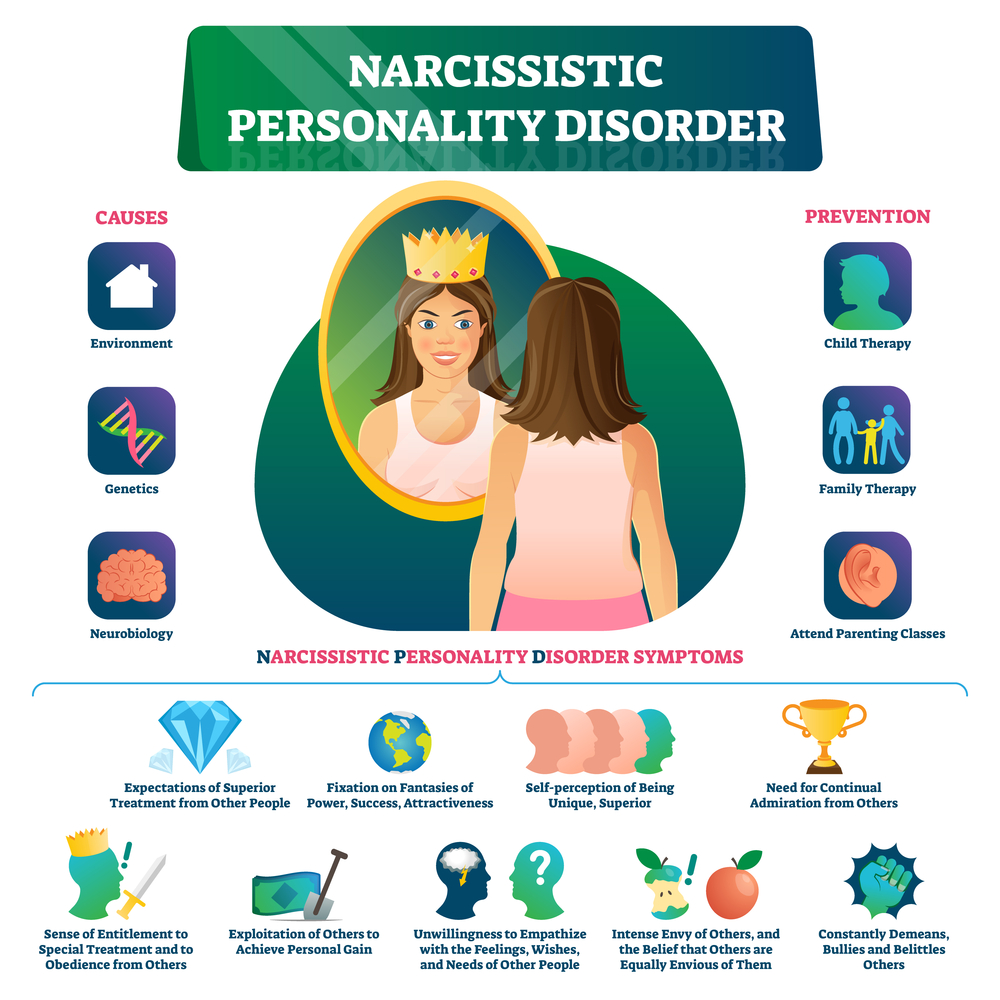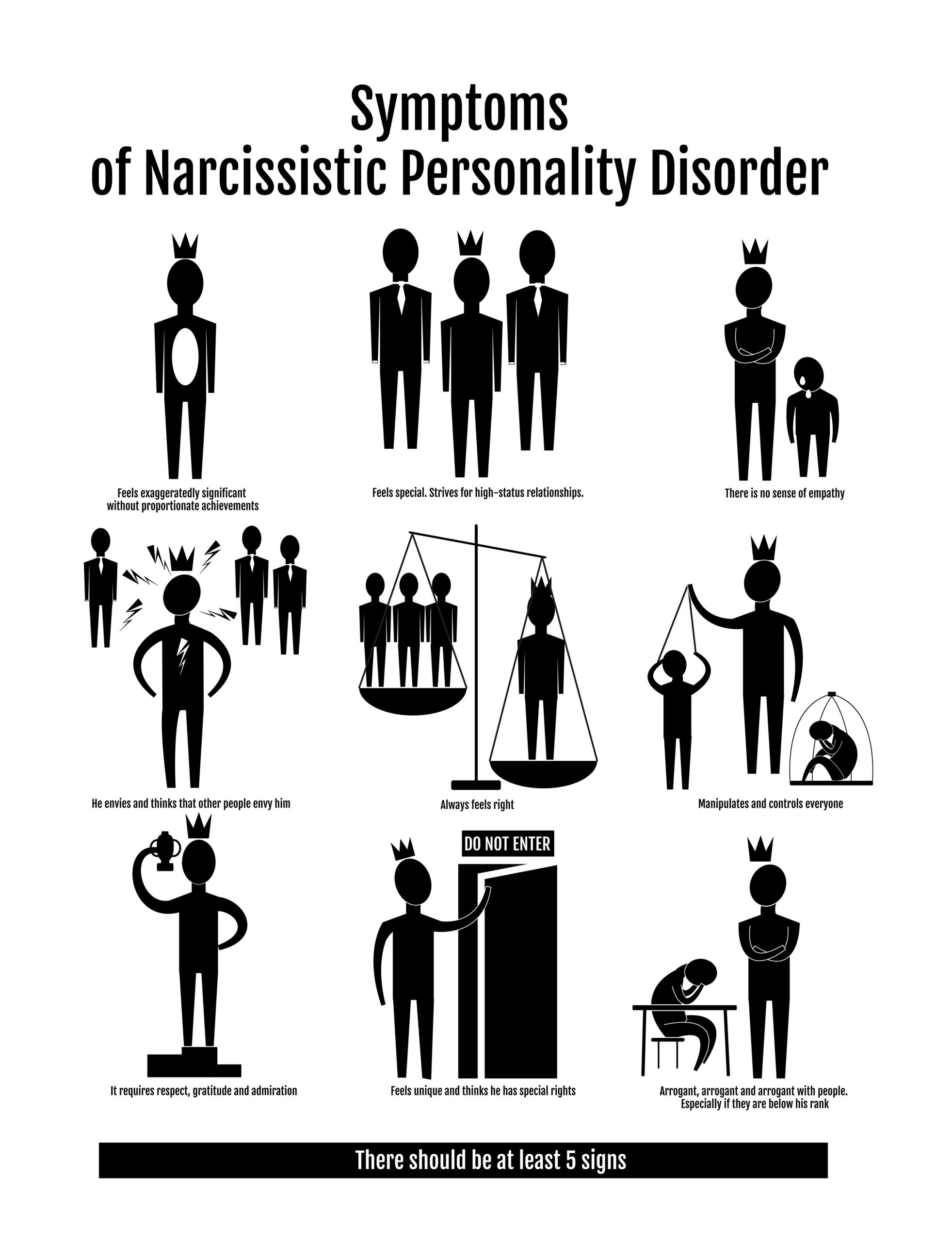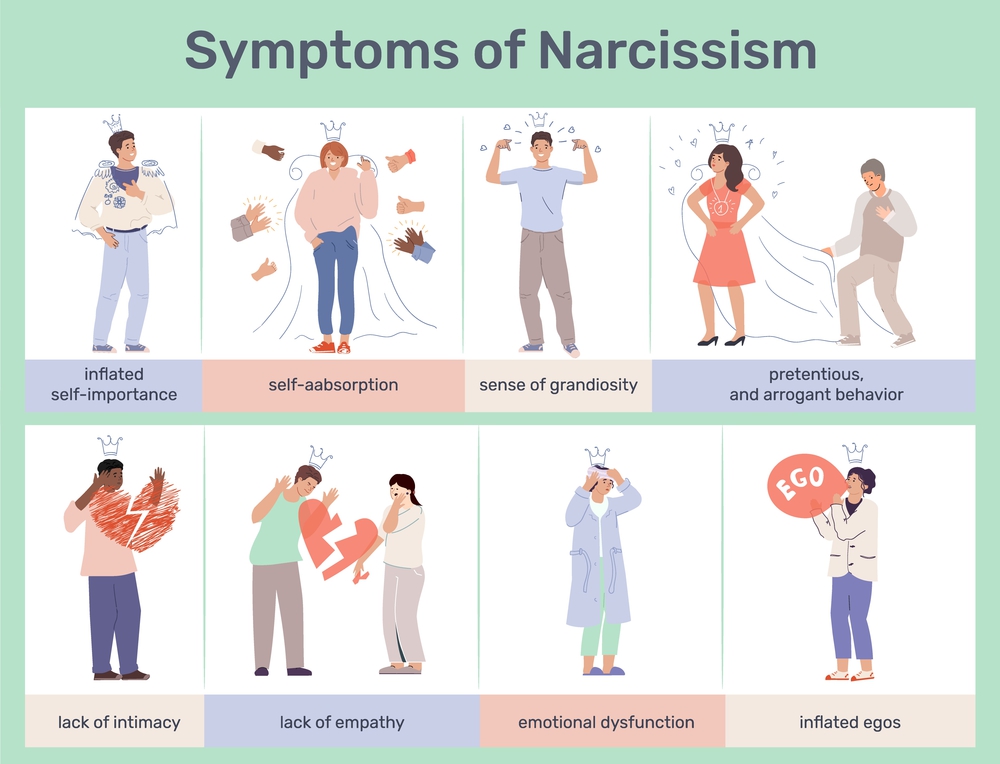Can A Narcissist Love? Understanding The Complexities Of Narcissistic Relationships
 Have you ever wondered if a narcissist's love is as elusive as a mirage in the desert? To solve this puzzle, we need to understand what happens in relationships with narcissists. In this article, we will explore the dynamics that define these relationships and examine whether a narcissist can genuinely love. While narcissists may occasionally […]
Have you ever wondered if a narcissist's love is as elusive as a mirage in the desert? To solve this puzzle, we need to understand what happens in relationships with narcissists. In this article, we will explore the dynamics that define these relationships and examine whether a narcissist can genuinely love. While narcissists may occasionally […]Have you ever wondered if a narcissist's love is as elusive as a mirage in the desert? To solve this puzzle, we need to understand what happens in relationships with narcissists. In this article, we will explore the dynamics that define these relationships and examine whether a narcissist can genuinely love.
While narcissists may occasionally show affection, their love often comes with strings attached and serves their interests. Instead of genuinely caring for their partner, they are more inclined to manipulate and exploit others to meet their needs.
Relationships with narcissists are filled with emotional abuse, gaslighting, and a lack of empathy. You can protect yourself and seek healthier connections by gaining insight into these relationships.

The Narcissist's Love: Real or Illusion?
Narcissistic relationships often puzzle those involved, leaving them to question the authenticity of the emotions exhibited. Understanding whether a narcissist is truly capable of love involves navigating a complex web of behaviors and psychological traits.
Unveiling Narcissistic Traits
Narcissists exhibit various traits, including an inflated sense of self-importance, a constant need for admiration, and a lack of empathy. These characteristics shape their interactions and relationships.
Moreover, narcissists often showcase paradoxical behavior; they may appear confident yet are plagued by insecurities. This dichotomy plays a significant role in their relationships, as their exaggerated self-importance often masks fragile self-esteem.
Narcissists possess the ability to emulate love. At the onset of a relationship, they excel at projecting affection, devotion, and charm, creating an illusion of genuine love. However, this love often serves their self-interests and is a tool for manipulation.
In a narcissistic relationship, love is primarily directed towards fulfilling the narcissist's needs. Their perspective on love is transactional. They view relationships as a means to an end, often seeking partners who enhance their status or provide them with something they desire.
This transactional view of love results in relationships that lack mutual respect and understanding, making the emotional depth and commitment typical in healthier relationships scarce. Their love is conditional, it revolves around how the relationship benefits them, lacking the depth of genuine emotional connection.
Understanding Narcissistic Behavior in Relationships
Narcissists tend to idealize their partners initially, showering them with affection. However, this phase is often short-lived, followed by devaluation, where they criticize, demean, or emotionally distance themselves from their partner.
Their inability to sustain long-term, meaningful connections stems from their deep-seated insecurity and fear of vulnerability. This fear fuels their manipulative behaviors, hindering genuine emotional bonds.
Additionally, their communication style often reflects their self-centeredness. They may engage in gaslighting or use affection as a bargaining chip, further exacerbating the power imbalance in the relationship. Such dynamics lead to a one-sided relationship where the partner's needs and feelings are consistently sidelined or ignored.
 Unraveling Narcissistic Love: A Psychological Analysis
Unraveling Narcissistic Love: A Psychological Analysis
Navigating the intricacies of narcissistic love requires a deep dive into the psyche of individuals exhibiting such traits. Understanding the underlying psychological mechanisms sheds light on the complexities of love within narcissistic relationships.
It is also important to recognize that their perception of love is often rooted in their childhood experiences.
Many narcissists have faced trauma or neglect, leading them to develop coping mechanisms that manifest as narcissistic traits. These past experiences significantly influence their understanding and expression of love, often skewing it towards self-preservation rather than mutual affection and care.
Ego-Centric Love
Narcissistic love revolves around the narcissist's ego. Their need for admiration and validation fuels their perception of love, where the partner becomes an extension of their self-image rather than an individual with their needs.
Emotional Deficiency
Narcissists' approach to relationships often mirrors their internal emotional landscape. They might display affection and closeness when it serves their image or needs, but this affection often lacks consistency and sincerity.
Their emotional deficiency affects their ability to love and their partner's emotional well-being, often leading to a cycle of emotional highs and lows in the relationship.
Vulnerability Aversion
Narcissists avoid vulnerability at all costs. Love involves vulnerability, yet their fear of being emotionally exposed drives them to maintain control and manipulate situations to their advantage.
This aversion to vulnerability often leads them to engage in relationships with a power dynamic that favors them. They might choose partners more emotionally giving or submissive, allowing them to maintain the upper hand.
Signs of Love or Manipulation? Decoding Narcissistic Relationships
Initially, narcissists display intense charm, drawing their partners in. However, this charm often masks manipulative behaviors aimed at controlling the relationship dynamics.
Gaslighting is a common tactic employed by narcissists. They distort reality, making their partners doubt their perceptions and feelings, leading to emotional abuse and confusion.
Love from a narcissist comes with conditions. They offer affection and validation when it aligns with their needs but withdraw it as punishment or control when their needs aren't met.
The cycle of idealization and devaluation in narcissistic relationships involves the swift shift from intense admiration to devaluation, where partners are belittled or discarded.
Deciphering the signs between genuine love and manipulation in narcissistic relationships is a daunting task. Understanding the underlying manipulative behaviors and psychological patterns provides insight into distinguishing between the two.
 Love or Narcissistic Supply: The Hidden Motives of a Narcissist
Love or Narcissistic Supply: The Hidden Motives of a Narcissist
Delving into the motives behind a narcissist's actions reveals a stark contrast between genuine love and their pursuit of narcissistic supply. Understanding these underlying motives provides clarity into the complexities of relationships with narcissists.
The Narcissist's Motivations
Narcissists thrive on validation and admiration. Their pursuit of love often intertwines with the constant need for external validation to support their fragile self-esteem.
In relationships, narcissists seek control and dominance. Their love is often a means to establish power dynamics, manipulating emotions and situations to maintain authority.
Narcissists often leverage love to mask their insecurities. They may exhibit intense affection or grand gestures to distract from their vulnerabilities. This behavior confuses partners, as the narcissist's need for dominance often contradicts these seemingly loving actions.
Love serves as a tool for narcissists to gratify their ego. Their partners become instruments for bolstering their self-image and fulfilling their desires rather than equals in a loving relationship.
Healing from Narcissistic Love: Overcoming the Emotional Trauma
Recognizing and acknowledging emotional abuse within a narcissistic relationship is the initial step toward healing. Understanding the manipulation tactics employed is crucial for emotional recovery.
Recovery and Self-Care
Establishing and enforcing boundaries is essential for post-narcissistic relationships. Creating distance from the narcissist and prioritizing self-care fosters emotional healing and stability.
Seeking therapy or counseling aids in processing the emotional trauma inflicted by the narcissistic relationship. Therapeutic interventions offer guidance and strategies to rebuild self-esteem and trust.
Engaging in self-reflection and personal growth activities promotes self-love and resilience. Investing in personal development allows individuals to regain confidence and move forward from the emotional trauma.
Recovering from the aftermath of a narcissistic relationship involves understanding the underlying motives of the narcissist and implementing strategies for emotional healing and growth. Individuals can journey toward emotional recovery and reclaim their self-worth through self-care, professional support, and self-reflection.
Breaking Free: Escaping the Grip of a Narcissistic Relationship
Exiting a narcissistic relationship requires strength, determination, and strategic planning. Breaking free from the grasp of a narcissist involves a series of steps aimed at reclaiming autonomy and fostering a life void of manipulation and toxicity.
Recognizing the Need to Leave
Acknowledging the toxic nature of the relationship and realizing the detrimental impact it has on mental and emotional well-being is crucial. This awareness serves as the initial catalyst for departure.
Planning an Exit Strategy
Crafting a well-thought-out exit plan ensures safety and minimizes potential backlash. Securing support networks, gathering essential documents, and seeking professional advice aid in a smooth departure.
Implementing No-Contact
Enforcing strict no-contact boundaries post-separation is imperative. Cutting off all forms of communication helps in detaching emotionally and prevents manipulation attempts by the narcissist.
Support Networks
Reconnecting with friends and family or joining new groups provides a sense of community and belonging, which is often lost in narcissistic relationships. These social connections offer emotional support, advice, and a sense of normalcy, which are vital in regaining independence and emotional health post-relationship.
Embracing Self-Healing
Engaging in self-care practices, therapy, and support groups fosters healing and recovery. Embracing activities that promote self-love and empowerment aids in rebuilding a sense of identity.
Conclusion
Narcissistic relationships embody complexities that often obscure the true essence of love. The thin line between manipulation and affection blurs the distinction, entangling individuals in a web of emotional turmoil.
Understanding the manipulative tactics and underlying motives of narcissists is crucial in differentiating genuine love from the narcissistic supply. Healing from the aftermath of such relationships involves a journey of self-discovery and emotional recovery.
Breaking free from the grips of a narcissistic relationship demands courage and resilience. Through awareness, strategic planning, and prioritizing self-care, individuals can embark on a path towards liberation and reclaiming their emotional well-being.

